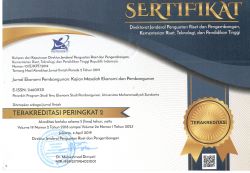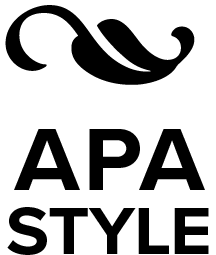The Utilization of Zakah Productive towards Micro-Business Growth and Mustahik Welfare
Muhammad Irfan Nasution(1*), Muhammad Andi Prayogi(2)(1) Faculty Economics and Business, University of Muhammadiyah Sumatera Utara Jalan Kapten Mukhtar Basri No. 3 Medan
(2) Faculty Economics and Business, University of Muhammadiyah Sumatera Utara Jalan Kapten Mukhtar Basri No. 3 Medan
(*) Corresponding Author
Abstract
One of the basic laws that the zakat seems to be ordered is the word of Allah SWT QS. At-Taubah verse 103, The study aims to analyze the effect of productive Zakat, Infak, Sedekah (ZIS) to the micro-business growth of mustahik of Muhammadiyah Society in Medan City, micro-business growth towards mustahik welfare of Muhammadiyah Society in Medan City, and simultaneously effect of Productive Zakat, Infak, Sedekah (ZIS) and micro-business growth to the mustahik welfare of Muhammadiyah society in Medan City. This research used quantitative descriptive analysis, the sample was selected by using quota sampling, and the data analysis technique used was multiple linear regression analysis. The results showed that there is a positive and significant influence between productive Zakat and mustahik welfare, there is a relationship between micro-business growth and mustahik welfare and also simultaneously there is a relationship between productive Zakat and the micro-business growth towards mustahik welfare of Muhammadiyah society in Medan city. The implication of this study is emphasizing the distribution of Zakat that more prioritizing on Productive Zakat.
Keywords
Full Text:
PDFReferences
Anwar. (2017). The Law of Productive Zakat in Islam and Its Impact Towards Economy. International Journal of Engineering Technologies and Management Research, 4(2), 10–21. https://doi.org/10.5281/zenodo.293800
Arif, M. N. R. Al. (2010). Efek Pengganda Zakat Serta Implikasinya Terhadap Program Pengentasan Kemiskinan. Jurnal Ekbisi Fakultas Syariah UIN Sunan Kalijaga Yogyakarta, 5(1), 42–49.
Asdiansyuri, U. (2016). Influence Analysis Expenditure Zakat, Infak Welfare And Charity Against Muzakki (Studies In Baznas In West Lombok Regency). International Journal of Social and Local Economic Governance, 2(1), 23–31.
Asnaini. (2008). Zakat Produktif dalam Perspektif Hukum Islam. Yogyakarta: Pustaka Pelajar.
Beik, I. S., & Pratama, C. (2015). Zakat Impact on Poverty and Welfare of Mustahik : A CIBEST Model Aproach. In The 3rd Islamic Economics and Finance Forum (Vol. 3, pp. 1–12). Jakarta: Otoritas Jasa Keuangan (OJK), DPP Ikatan Ahli Ekonomi Islam (IAEI) and Faculty of Economics and Business, University of Indonesia, April 28-29, 2015.
Bello, D. A. (2010). Islamic Social Welfare and the Role of Zakah in the Family System (MPRA Paper). Ghana.
Bidol, S., Basalamah, S., Rusjdin, & Su’un, M. (2017). The Influence of Governance Dimension on Zakah Acquisition for Mustahiq Business Continuity in South Sulawesi. IOSR Journal of Business and Management, 19(11), 57–65. https://doi.org/10.9790/487X-1911065765
Damanhur, Nuruddin, A., & Siregar, S. (2017). The Model of Productive Zakat Distribution In Increasing The Society Welfare In Aceh Province. Journal Of Humanities And Social Science (IOSR-JHSS), 22(11), 77–82. https://doi.org/10.9790/0837-2211067782
Faisal, A., & Yuliani, I. (2017). Productive Zakat of Baznas Yogyakarta on the Growth of Micro Business. Shirkah Journal of Economics and Busines, 2(3), 2503–4243.
Farid, M., Sukarno, H., & Puspitasari, N. (2015). The Analysis of Distribution Effect on Productive Zakat Toward Mustahiq ’ s Profit. Artikel ILmiah Mahasiswa, 1–8.
Hapsari, P. P., Hakim, A., & Soeaidy, S. (2014). Pengaruh Pertumbuhan Usaha Kecil Menengah (UKM) terhadap Pertumbuhan Ekonomi Daerah (Studi di Pemerintah Kota Batu). Wacana, 17(2), 88–96.
Hoque, N., Khan, M. A., & Mohammad, K. D. (2015). Poverty alleviation by Zakah in a transitional economy: a small business entrepreneurial framework. Journal of Global Entrepreneurship Research, 5(1), 1–20. https://doi.org/10.1186/s40497-015-0025-8
Jalaludin. (2012). Pengaruh Zakat Infaq Dan Sadaqah Produktif Terhadap Pertumbuhan Usaha Mikro Dan Penyerapan Tenaga Kerja Serta Kesejahteraan Mustahik. Majalah Ekonomi, 22(3), 270–277.
Johari, F., Ali, A. F. M., & Aziz, M. R. A. (2015). A Review of Literatures on Current Zakat Issues: An Analysis between 2003 - 2013. International Review of Research in Emerging Markets and the Global Economy (IRREM), 1(2), 336–363.
Johari, F., Aziz, M. R. A., Ibrahim, M. F., & Ali, A. F. M. (2013). The Roles of Islamic Social Welfare Assistant (Zakat) for the Economic Development of New Convert. Middle-East Journal of Scientific Research, 18(3), 330–339. https://doi.org/10.5829/idosi.mejsr.2013.18.3.12368
Juan Suam Toro, M., Amien Gunadi, M., & Piliyanti, I. (2013). Zakat Untuk Sektor Produktif: Studi Pada Organisasi Pengelola Zakat Di Surakarta. Inferensi, 7(2), 431–450.
Kasim, M. A. B., & Siswanto, I. E. (2014). Analisis Efektivitas Pendayagunaan Zakat Produktif Pada Program Pemberdayaan Masyarakat Di Wilayah Sukabumi (Studi Kasus: Kampoeng Ternak Dompet Dhuafa). Jurnal Ekonomi Dan Perbankan Syariah, 2(1), 72–98.
M. Yazid Sofyan Sungkar, A. R. H. (2015). Pengaruh penyaluran dana zakat produktif modal usaha terhadap peningkatan usaha. In Prosiding Keuangan dan Perbankan Syariah (pp. 213–220). Bandung: Universitas Islam Bandung (Unisba).
Mujiatun, S. (2018). The Constraints Of Management Of Zakat And Its Potentials In Poverty Reduction ( Case Study Medan City ). Advances in Social Sciences Research Journal, 5(6), 104–109.
Muliyaningsih, H. D. (2014). Social Entrepreneurship in Islamic Social Welfare System Hendrati Dwi Muliyaningsih 1 ? Telkom Economics and Business School - Business Administration Department Abstract. In International Proceedings of Economics Development and Research (Vol. 73, pp. 5–9). https://doi.org/10.7763/IPEDR.
Nafiah, L. (2015). Pengaruh Pendayagunaan Zakat Produktif Terhadap Kesejahteraan Mustahiq Pada Program Ternak Bergulir Baznas Kabupaten Gresik. Jurnal EL-Qist, 05(01), 307–321.
Nur Wahyudi, & Ubaidillah. (2015). Penerapan Dana Zakat Produktif Terhadap Keuntungan Usaha Mustahik Zakat. Al-Mustashfa: Jurnal Penelitian Hukum Ekonomi Syariah, 3(2), 24–31.
Nurzaman, M. S. (2010). Zakat and Human Development: An Empirical Analysis on Poverty Alleviation in Jakarta , Indonesia. In 8th International Conference on Islamic Economics and Fnance (pp. 1–26).
Pailis, E. A., Burhan, U., Multifiah, & Ashar, K. (2016). The Influence of Maqashid syariah toward Mustahik ’ s Empowerment and Welfare (Study of Productive Zakat Recipients on Baznas Riau). American Journal of Economics, 6(2), 96–106. https://doi.org/10.5923/j.economics.20160602.02
Rina Murniati, I. S. B. (2016). Pengaruh Zakat Terhadap Indeks Pembangunan Manusia dan Tingkat Kemiskinan Mustahik : Studi Kasus Pendayagunaan BAZNAS Kota Bogor. Jurnal Al-Muzara’ah, 2(2), 131–146.
Romdhoni, A. H. (2017). Zakat Dalam Mendorong Pertumbuhan Ekonomi Dan Pengentasan Kemiskinan. Jurnal Ilmiah Ekonomi Islam, 3(1), 41–51.
Sartika, M. (2008). Pengaruh Pendayagunaan Zakat Produktif terhadap Pemberdayaan Mustahiq pada LAZ Yayasan Solo Peduli Surakarta. Jurnal La Riba (Jurnal Ekonomi Islam), 2(1), 75–89.
Sulistyo, H., & Cahyono, B. (2014). The Effectiveness of Zakah, Infaq, Sadaqah (ZIS) Management by BAZDA to Improve the Welfare of Society in Central Java. Global Review of Islamic Economics and Business, 2(2), 98–109. https://doi.org/10.2298/JAS1403255T
Sunarti, E. (2006). Indikator Keluarga Sejahtera: Sejarah Pengembangan, Evaluasi, dan Keberlanjutannya.
Utami, S. H., & Lubis, I. (2013). Pengaruh Pendayagunaan Zakat Produktif Terhadap Pemberdayaan Mustahiq di Kota Medan. Jurnal Ekonomi Dan Keuangan, 2(6), 353–366.
Yuli, S. B. C. (2015). Optimalisasi Peran Wakaf Dalam Pemberdayaan Usaha Mikro, Kecil Dan Menengah (UMKM). Journal Of Innovation in Business & Economics, 6(1), 1–16.
Article Metrics
Abstract view(s): 2741 time(s)PDF: 1841 time(s)
Refbacks
- There are currently no refbacks.















